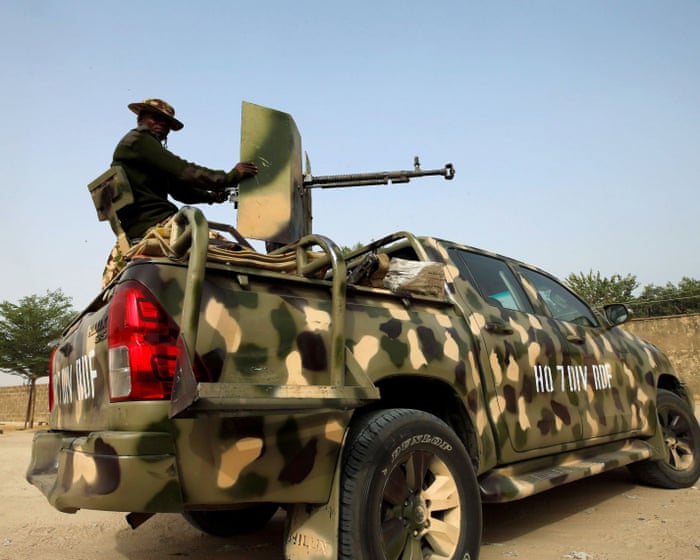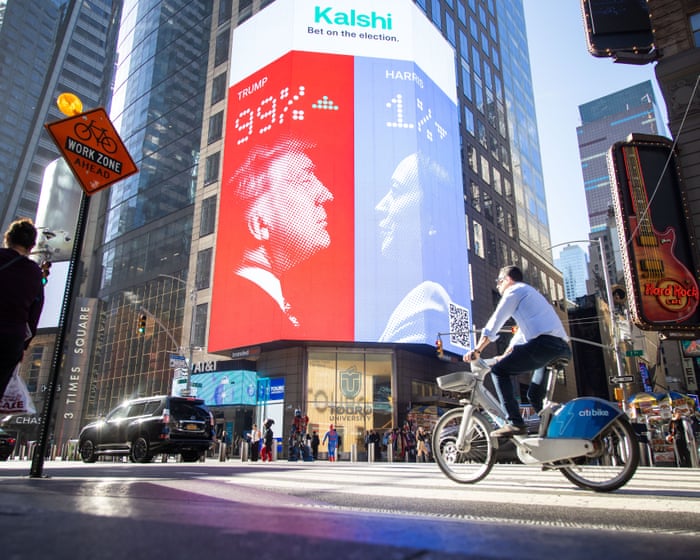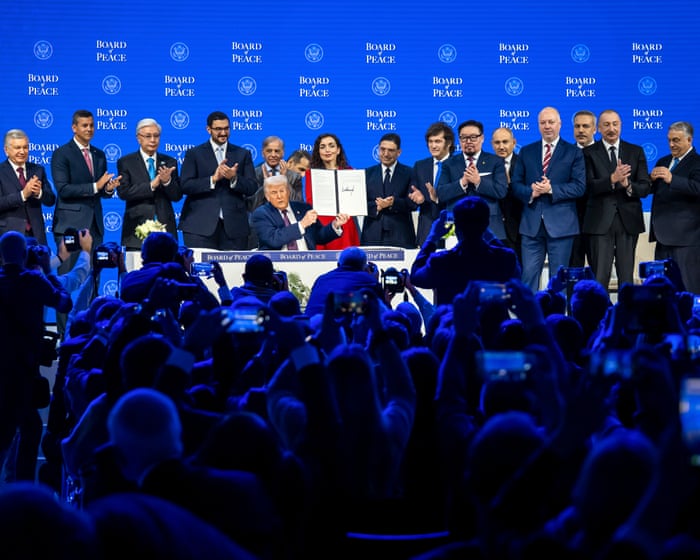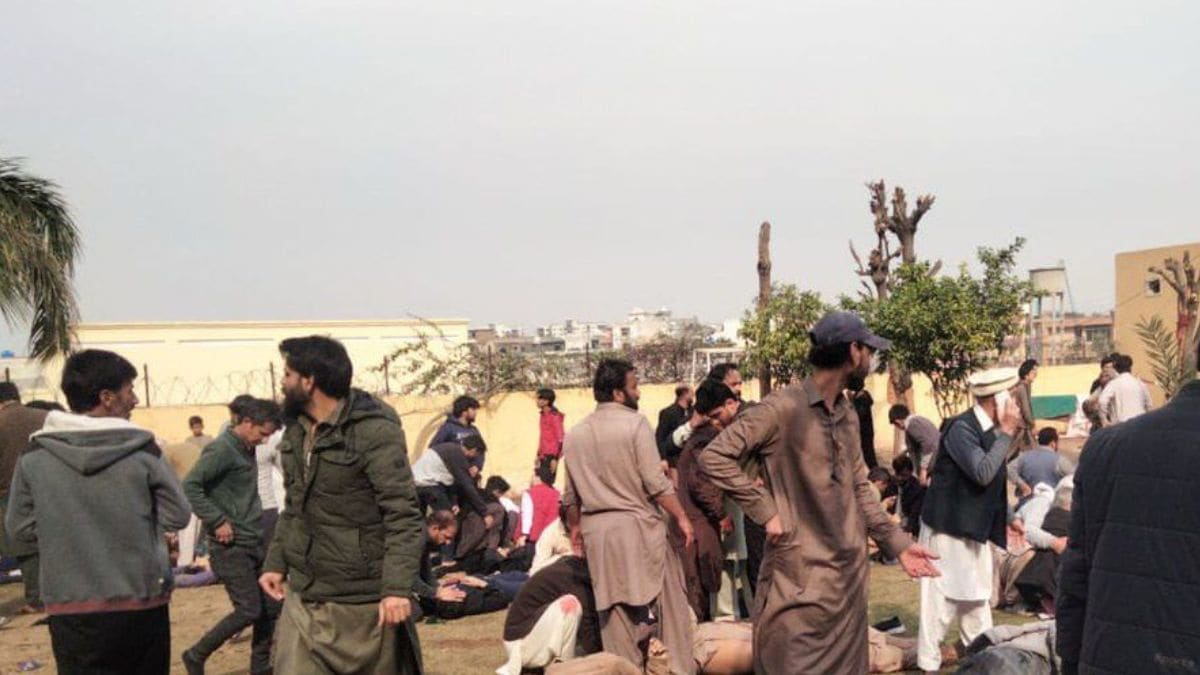Top World News
Taiwan-US ties are ‘rock solid,’ the island’s president says after Trump-Xi call
Taiwan’s ties with the United States are “rock solid,” the island’s president said Thursday, hours after President Donald Trump and Chinese leader Xi Jinping spoke on the phone, including about the self-ruled island’s future
Green energy sector drove more than 90% of China’s investment growth last year, analysis finds
Industry bigger than all but seven world economies, and accounts for more than third of China’s economic growthChina’s clean energy industries drove more than 90% of the country’s investment growth last year, making the sectors bigger than all but seven of the world’s economies, a new analysis has shown.For the second time in three years, the report showed the manufacture, installation and export of batteries, electric cars, solar, wind and related technologies accounted for more than a third of China’s economic growth. Continue reading...
Firestorm as Washington Post lays off reporter in the middle of a 'frigid warzone'
Outrage erupted Wednesday after The Washington Post announced it would lay off more than 300 people from its newsroom — including a reporter in the middle of a warzone in Ukraine.The reporter received the news under harsh conditions while covering the war in Ukraine. "I was just laid off by The Washington Post in the middle of a warzone. I have no words. I'm devastated," reporter Lizzie Johnson wrote on X.The move to cut one-third of the staff was met with sharp criticism. "A publisher who lays off a reporter whose pen is freezing because she's covering a frigid war zone while dodging missiles is not an editor you want to work for, in a more perfect world," journalist and professor Bill Grueskin wrote on Bluesky."I am appalled by this. please be in touch if you’re interested in continuing to cover Russia/Ukraine, either full time or as a stringer. least i can do is introduce you to the folks making our relevant hiring decisions," author and political scientist Ian Bremmer wrote on X."I’m so sorry. Thank you for your courageous and indispensable work," New York Times columnist David French wrote on X."So sorry my friend - I truly feel for all of you guys but particularly for those dodging fire," CNN anchor Jim Sciutto wrote on X.
Gunmen kill more than 160 people in attacks on two west Nigeria villages
Local politician says armed men rounded up residents, bound their hands behind their backs and shot themMore than 160 people have been killed in two villages in western Nigeria in the country’s deadliest armed assaults this year, as communities reel from repeated and widespread acts of violence perpetrated by jihadists and other armed groups.The death toll from Tuesday’s attacks in Woro and Nuku in Kwara state stood at 162 on Wednesday afternoon, according to Mohammed Omar Bio, a member of parliament representing the area. Continue reading...
Regional health organization issues alert as measles cases surge across the Americas
The Pan American Health Organization has issued an alert due to a surge in measles cases across the Americas, with Mexico reporting the highest numbers
Italy averted Russian-linked cyberattacks targeting Winter Olympics websites
Foreign Minister Antonio Tajani says Italy has foiled a series of cyberattacks targeting some of its foreign ministry offices, including one in Washington, as well as Winter Olympics websites and hotels in Cortina d’Ampezzo
The people betting on catastrophic world events – podcast
Prediction markets allow you to put money on everything from the US attacking Iran to Jesus returning. Saahil Desai explains their dizzying riseIn the early hours of 3 January, Donald Trump ordered a surprise attack on the Venezuelan capital, Caracas, to kidnap the country’s leader, Nicolás Maduro. Millions of Venezuelans’ lives were thrown into uncertainty. Politicians at home and abroad scrambled to respond. It seemed this was something no one had seen coming. Except one person did actually predict it.In the hours before the attack, someone - and we have no way of knowing who - placed a series of bets that Donald Trump would oust Maduro on a prediction market platform, netting them nearly $500,000 when it happened. These platforms allow their users not just to bet on whoever’s going to win the Super Bowl, but also on world events. Heavily regulated under the Biden administration, these apps have enjoyed a huge boom in popularity since Trump came to power. Continue reading...
Trump-led abuses amid ‘democratic recession’ put human rights in peril, HRW report says
Rights group says growing authoritarianism and abuses in US, Russia and China threaten global rules-based orderThe world is in a “democratic recession” with almost three-quarters of the global population now living under autocratic rulers – levels not seen since the 1980s, according to a new report.The system underpinning human rights was “in peril”, said Philippe Bolopion, executive director of Human Rights Watch (HRW), with a growing authoritarian wave becoming “the challenge of a generation”, he said. Continue reading...
Pope orders angel's face scrubbed from church fresco after spotting Trump ally
The Roman diocese, led by Pope Leo XIV, has ordered a church to alter an angel's face painted on a fresco that bears a close resemblance to one of President Donald Trump's closest European allies. An Italian newspaper reported over the weekend that a newly restored fresco at Rome's Basilica of San Lorenzo in Lucina included an angel whose updated face appeared to resemble Italian Prime Minister Giorgia Meloni, although artist Bruno Valentinetti denied that was his intention and the parish priest defended the work, reported The Daily Beast.“It doesn’t mean we’re Meloni supporters,” parish priest Daniele Micheletti told La Repubblica on Saturday. “Maybe we are Meloni supporters, but we don’t say so. The face of King Umberto II is also there, does that mean we’re monarchists?”Technicians from the Roman diocese, which is headed by the America-born pope, told the priest the painting needed to be altered to remove Meloni's likeness, and Cardinal Vicar Baldassare Reina, a close ally of Leo's, issued a "firm" statement.“Images of sacred art and the Christian tradition can be misused or exploited, as they are intended exclusively to support liturgical life," the cardinal vicar said.Micheletti agreed to have the 13th-century basilica's fresco, which Valentinetti himself had originally painted in 2000, modified after speaking to diocese officials.Pope Leo has spoken out against Trump's immigration policies and expansionist threats and shared some of those disagreements directly with Vice President JD Vance, who converted to Catholicism as an adult, during a face-to-face meeting in May.
Trump threatens 'new terrifying world' as China gift risks end of vital peace pact
A treaty between Russia and the U.S. could expire shortly because of a standstill over country membership. An ex-Pentagon official said the potential expiry is a frustrating one, and it appears Donald Trump is caught up in a detail that, to the former official, makes little difference. Kingston Reiff warned the new START deal, which will expire on February 5, had offered valuable insight into what Russia had been doing with its military. He wrote, "So, my net assessment is the treaty reduced uncertainty about Russian strategic nuclear forces and provided us with greater confidence in our own nuclear plans and capabilities."But Reiff has since suggested the deal may lapse because Trump wants to include China in the agreement, something which has puzzled the former Pentagon worker. He wrote, "It was never clear to me why we should jettison all limits on Russian strategic forces because New START wasn’t a panacea that captured all nuclear weapons — which of course it was never intended to be."Same goes for the argument the treaty didn’t include China. During the treaty’s 15-year existence, the limits have been sufficient to meet U.S. deterrence objectives against both Russia and China. (Whether this remains the case is a topic of significant debate.)"In the end, factors outside the scope of the treaty ultimately became too much for it to overcome. These included the onset of the COVID pandemic in early 2020, which put the treaty inspections on ice, and Russia’s unconscionable invasion of Ukraine. "Since New START's entry into force, there has been no real progress on further arms control measures. Moscow and Beijing deserve most of the blame for this. Charting a course to the next chapter will not be easy, but remains a necessary pursuit."Democratic Party representatives are equally concerned, with John Garamendi (CA) suggesting the deal must not collapse. He told Politico, "If we allow New START to lapse without a replacement or an extension, we will be entering a new terrifying world we haven’t seen in decades: a world without limits on the nuclear arsenals of the two largest nuclear powers."
'Nice and slow': Trump gives odd rant about plane stairs when asked about foreign policy
President Donald Trump unleashed a rant about risky airplane stairs after he was asked to explain his so-called Donroe Doctrine foreign policy.During a Monday interview on The Dan Bongino Show, the host asked the president for his take on the Monroe Doctrine after a U.S. military attack on Venezuela."We were laughed at a year and a half ago. We were laughed at as being stupid people," Trump asserted. "We were laughed at it not as, we see a guy falling up the stairs going into an airplane.""I got to be very careful going in," Trump continued. "Nice and slow. I'm not looking to set any records. You don't want to go down. Could happen. I mean, you'll get up. But it can't happen three times in one shot, okay? The three times going up to say, I don't think you'll ever see anything like that. But it could happen."The president seemed to shift into a story about former President Barack Obama without mentioning his name."That was the one thing I have to tell you," he said. "It's probably the only thing I respected, and yet it didn't look elegant at all. He bopped down the stairs. He would be in the middle. I thought it looked so terrible. You know, I mean, this is the president of the United States. He's bopping down, you know, bop-bop, bop, bop, bop, bop, bop. And I kept waiting for him to fall, and he didn't. So I would rather have other traits than that."
This foul Trump lie falls apart at the slightest touch
Here’s a quick civics test for those concerned with the U.S. immigration issue.Q. Donald Trump has publicly stated at least a thousand times that other countries have emptied their prisons and asylums and sent criminals across our border. Name one.Feel free to use any search engine or AI resource you’d like. Just name one prison or asylum anywhere that was emptied to send criminals to America.You can’t do it because it never happened. It’s a pure fiction invented from scratch by Trump and repeated often enough to brainwash millions of people. And it worked.Just like it worked to repeat that 10.5 million people illegally “invaded” during Joe Biden's presidency. Or that thousands of murderers, rapists, and child molesters have been unleashed on America. Or that MS-13 gangs are inflicting a “migrant crime wave” on U.S. cities.All that makes for some fiery speeches and intensely inflamed emotions, even among those who pride themselves on moderation. The lies are compelling.In fact, the entire premise that the U.S. today faces some new existential crisis — unlike anything it’s ever experienced before — could not be more false. It also could not be more believed by millions of Americans.I stumbled upon the best example of this in researching this piece.The most authoritative source on immigration data, Pew Research Center, reported in August 2025 that roughly 14 million undocumented people reside in the U.S. illegally today. Using Pew’s data, we can make an apples-to-apples comparison across decades.In 2007, under President George W. Bush, Pew measured 12.2 million undocumented people — with a total U.S. population of 301 million. Today’s U.S. population is roughly 349 million.Do the math: About 4.05 percent of people living in the U.S. were undocumented in 2007. Today, that figure is 4.01 percent.Let that sink in. The proportion of undocumented people in America hasn’t changed in nearly two decades.Immigration policy has always been contentious, but it wasn’t viewed as an existential crisis back then. It wasn’t a major issue in the 2008 presidential campaign, or the ones after that — not until Trump rode down his infamous escalator and declared that Mexico was sending rapists and other criminals to the U.S.Trump’s demagoguery worked. The previously unthinkable idea of federal agents using storm-trooper tactics to terrorize millions of citizens and non-citizens alike no longer draws the universal condemnation it should. All because the scope and nature of the immigration “problem” have been so badly distorted.Here’s what the actual data shows:Data collected by Texas in 2025 — anything but a liberal source — confirmed what it showed a decade earlier: that undocumented immigrants are arrested at a fraction of the rate of native-born citizens. Nationally, a 2025 Northwestern University study found that immigrants are now 60 percent less likely to be incarcerated than people born in the U.S. Conflating people here illegally with crime is just a talking point.As for the border “invasion,” that 10.5 million figure Republicans cite represents Customs and Border Protection encounters — not unique individuals crossing. It’s like saying that if the St. Louis Cardinals have 3 million in attendance, it means 3 million different people went to the games. Many encounters involve the same individuals being turned back repeatedly. The vast majority were turned away, and many who were admitted came legally seeking asylum under U.S. law.Here’s another fact that rarely gets mentioned: Between 40 and 45 percent of undocumented immigrants didn’t sneak across the border at all. They entered the United States legally on valid visas and simply overstayed.Without question, the Biden administration botched border security and handed Trump the demagogue’s dream: an “invaders” issue. Democrats made it worse by abandoning the Dreamers — young people brought here illegally who grew up thinking they were Americans and loving what they thought was their country.Remember them? In September 2017, 88 percent of Americans — including 79 percent of Republicans — supported allowing Dreamers to stay and apply for citizenship. Support remains strong, with recent polls showing 81 percent overall backing a pathway to citizenship.I wrote a commentary in 2022 for Raw Story criticizing Democrats for “blowing the immigration debate and hurting kids by hiding.” As a candidate for Congress in 2024, my position was straightforward: tighten border security and establish a path to citizenship for the Dreamers.I lost. But my fate was nothing compared to the tragedy of the Dreamers — first deserted by Democrats, and now left as collateral damage in Trump’s authoritarian playbook.Let’s stipulate that any number of people coming to the U.S. illegally and living in the shadows is too many. Let’s also stipulate that if someone here illegally commits a crime — large or small — they should face swift and fair justice.But none of that excuses what’s happening today. And not all the blame belongs to Republicans. Democrats, terrified of looking “soft” on immigration, have internalized the fear. They’ve gone mute while the lies stick — not just with politicians, but with media analysts and average Americans.Is illegal immigration too high? Of course. And it was an unspeakable tragedy that Laken Riley, Rachel Morin and Jocelyn Nungaray lost their lives at the hands of criminals who were in the country illegally — to justifiable outrage across the country.But it does nothing to diminish their suffering to consider that some 5,000 women are murdered annually in the United States, and an estimated 500,000 are victims of rape or sexual assault. Almost exclusively at the hands of U.S. citizens.It is nothing short of despicable to exploit three tragedies as proof of an immigrant crime wave as if those exponentially larger numbers didn’t exist.The horror of what’s happening across the country at the hands of ICE has finally begun to give some leaders the courage to resist Trump’s authoritarian surge. But to find any consensus or intelligent path forward on immigration policy will require a reset that has nothing to do with politics.Instead, America has to start dealing with the truth.Click here to subscribe to Ray Hartmann's Soapbox
















